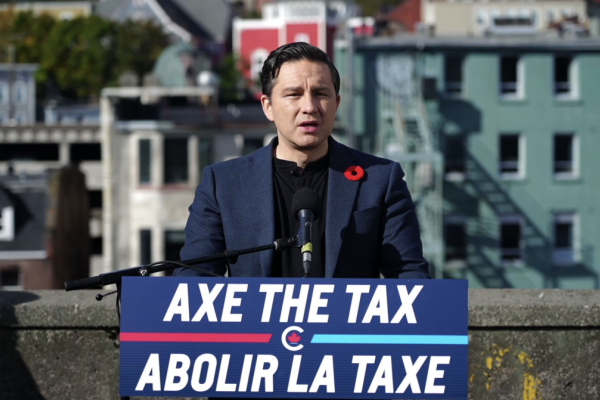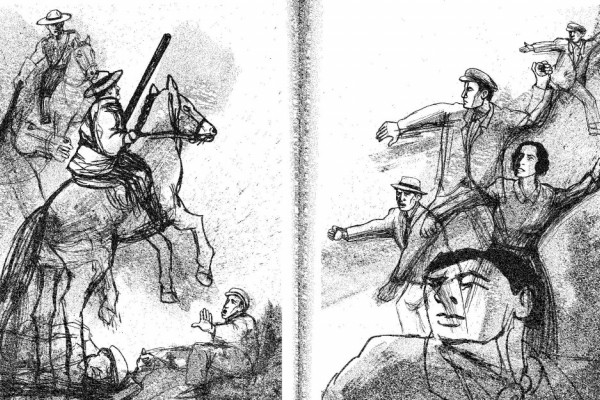Trudeau’s crisis-driven ‘reset’
Canada’s capitalist class is fortunate to have the political centre dominated by a loyal alternative to the Conservatives

Prime Minister Justin Trudeau speaks during his Press Conference at the Annual Meeting 2018 of the World Economic Forum in Davos, January 25, 2018. Photo by Valeriano Di Domenico/Flickr.
The impact of the WE Scandal on the Trudeau Liberals has doubtless been considerable but the far greater crisis of the pandemic also hangs over the decision to prorogue Parliament until September 23. With Bill Morneau out of the way, Trudeau seeks to convince us that this shabby little manoeuvre is a highly principled effort to bring before Parliament an effective and progressive response to the COVID crisis. He told the media that a Throne Speech and vote of confidence are necessary because “We need to reset the approach of this government for a recovery to build back better. And those are big, important decisions and we need to present that to Parliament and to gain the confidence of Parliament to move forward on this ambitious plan.”
Role of the Liberals
This ticklish “reset” of the political agenda is the latest strategy of Canada’s wily and resourceful political chameleon, the Liberal Party. In some other countries, such as the United Kingdom, right-wing conservative parties vie for power with social democrats as their main opponents. While social democratic parties have generally accepted prevailing political agendas, they have working class bases of support that exert pressure on their leaders. This can make them unpredictable and unreliable as political managers of capitalist states and economies. The period of the Corbyn leadership in the British Labour Party is the clearest and most recent example of this. The assumption that Tony Blair had thoroughly tamed Labour proved to be false; a break with the austerity consensus occurred and it took a prolonged and concerted effort on the part of the entire British establishment to regain control of the party.
In Canada, however, the capitalist class is fortunate to have the political centre dominated by a totally loyal and safe alternative to the Conservatives.
As Canadian capitalism has come into its own as a global exploiter and doubled down on implementing neoliberal austerity domestically, Liberal-Tory power sharing has served this agenda very effectively. In some regards, the Liberals have even outdone the Tories. The Chrétien-Martin austerity budgets of the mid-1990s were the turning point in terms of dismantling the post-war Canadian welfare state. Yet the Liberals have managed to preserve their ill-deserved progressive credentials which they contrast to their more crudely reactionary rivals.
This astounding Liberal ability to run with the hare and hunt with hounds is expressed very well in the person of Trudeau’s replacement for Finance Minister, Chrystia Freeland. In 2013, the year she was elected to the House of Commons, she gave a TED talk on “the rise of the new global super-rich” in which she thundered against increasing inequality, the global plutocracy and the crony capitalism out of which this layer had emerged. Yet, this very same plutocracy has very little to fear from Freeland.
A whole book could be devoted to exploring Chrystia Freeland’s services in the cause of global exploitation. Speaking as Foreign Affairs Minister in 2017, she suggested that massive increases in military spending were necessary because “Canadian diplomacy and development sometimes require the backing of hard power.” She played the leading role in the development, out of the most compliant and submissive regimes in Latin America and the Caribbean, of the so-called Lima Group, as a force devoted to overthrowing the government of Venezuela and reopening it for exploitation by the very global plutocracy she previously condemned. Nor can Freeland‘s imperialist antics be viewed as having been improvised on the go. Her vision of a Canadian role in dominating Latin America conjures images of Manifest Destiny. Last year, as she prepared to broker a meeting of the Lima Group, she declared: “This is our neighbourhood. For Canadians, we have a very direct interest in what happens in our hemisphere. That is why we have been so active and will continue to be so active.”
Now that she has taken up the role of Finance Minister, at a time of considerable crisis, gun boat diplomacy and regional domination have been put aside in favour of a commitment (in words, at least) to a progressive turn on the domestic front in the face of the pandemic. One Liberal who has worked closely with Freeland dutifully announced to the media that “She is a social interventionist activist, so she believes in the power of government and also believes in the redirection of funds to those who need it most.”
The reset
Freeland’s tenuous record as a force for good in the world offers a clue as to what we may expect from the Liberals after they regroup and bring forward a blueprint for a response to the economic fallout from the pandemic. Apart from their own self-inflicted credibility issues, they are improvising in the face of a massive and complex series of crises. The neoliberal decades have been marked by the corrosion of the pillars of social provision, particularly income support programs, so as to reduce workers’ bargaining power and step up exploitation. The pandemic lockdown and the threat of mass destitution that came with it, forced governments to take extraordinary measures of support that ran counter to everything they had been doing over recent decades.
For the most greedy and reckless elements of the capitalist class, the best way forward appears to be a rapid economic reopening, along with the removal of temporary income supports so as to drive people back into still unsafe workplaces. However, the situation is not without its complications. It seems very unlikely that we can avoid further waves of the pandemic, and consequently more lockdowns. Hopes for a quick “V-shaped” economic recovery have been dashed. Moreover, the enormous protests that erupted after the killing of George Floyd in Minneapolis and the beginnings of other resistance, such as that of tenants facing eviction, raise the prospect of serious social unrest in the harsh times ahead.
In this situation, the drive to reopen and return to neoliberal coercion is being tempered by fear and uncertainty about what lies ahead. This is playing out in different countries in different ways. In the United States, partisan discord has thrown everything into disarray and it is unclear what will become of the presently suspended extended unemployment insurance benefits. But whatever deal is finally struck, the measures taken are clearly going to fall far short of meeting existing needs. In the UK, the furlough scheme that has kept many afloat during recent months is coming to an end in October with predictably disastrous effect. Germany, on the other hand, is expected to extend its equivalent system of emergency provision.
In this situation, the Trudeau Liberals seek a way through that serves the interests of Canadian capitalism, while preserving a manageable level of stability and social peace. In response to some pressure, they have announced a $37 billion package that grants a one-month reprieve for the doomed Canada Emergency Response Benefit (CERB), establishes modest new “recovery” benefit programs and timidly enhances the system of austerity-damaged Employment Insurance (EI). However, Trudeau would have us believe that this is the trickle that precedes a huge wave of social reform. He told the media that “This is our chance to build a more resilient Canada, a Canada that is healthier and safer, greener and more competitive, a Canada that is more welcoming and more fair.”
We would be foolish to take the Liberals at their word when it comes to the prospects of substantially strengthening the social infrastructure since they are unwilling to impose the cost burden on the banks and corporations or to renounce the international neoliberal agenda they have prosecuted until now. It was not that long ago that Trudeau promised a bold national housing initiative and this proved to be a major disappointment and a stalking horse for neoliberal redevelopment. Since Trudeau’s minority government will have to find support if it is to win a confidence vote in September, the only real issue is whether it can secure the backing of the NDP. That remains an open question. But there is reason to worry that the NDP will demand relatively little and settle for even less allowing the Liberals to emerge with a response to the crisis that appeases Big Business while largely failing to secure the needs of workers and communities.
What takes place in the House of Commons in September will be of considerable interest but the fight for workers’ rights, decent income and housing that we take up outside of Parliament will be considerably more important. We can be sure that whatever Trudeau’s “ambitious plan” looks like in the end, that fight will remain urgent and inescapable.
John Clarke is a writer and retired organizer for the Ontario Coalition Against Poverty (OCAP). Follow his tweets at @JohnOCAP and blog at johnclarkeblog.com.










